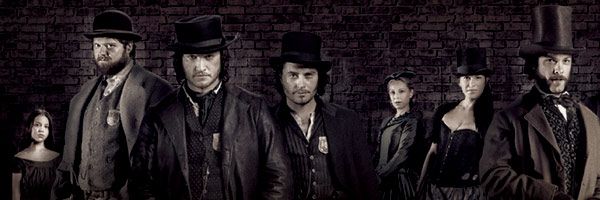BBC America's new original series Copper seems an odd foray for a cable network built on rerunning some of the best programming from across the pond, though Copper is itself a bit of an amalgam of foreign and American interests (although in this case, Irish rather than British). It's 1864 New York, and Irish immigrant police detective Kevin "Corky" Corcoran (Tom Weston-Jones, MI-5) is exactly the type of ruggedly handsome, clever, morally complex hero with a tragic backstory you would expect to anchor such a work. And as of the first two episodes, Weston-Jones does an adequate job in charming viewers enough to take an interest in Corcoran as a protagonist and hero as he fights against (and occasionally participates in) a corrupt police force in a corrupt city.
Copper comes out of the box with violence and grit and doesn't easily let up. It relishes portraying the slums of the kind of day where you could punch a man carrying the corpse of a dead child for interrupting you being pleasured (or about to be) by another child. There's plenty of liquor, fighting and busty whores; this is a series for adults, and Copper doesn't let it be forgotten. Though it could be compared to -- and does borrow from -- series covering roughly the same time period and themes (Hell on Wheels, Deadwood), it owes the most to Scorsese's Gangs of New York, taking place just after the New York Draft Riots of 1863 which acted as the climax of that film, and in the same Five Points slum. But for more on why Copper may be worth a trip into the gutter, hit the jump.
There are elements to Copper that, while they don't feel fresh (narratively speaking), at least are interesting enough to pull one into its world. Producer Tom Fontana has said though the series is set the 1860s, it knowingly has a "modern" feel to it. I've said a similar thing about Hell on Wheels, though not as a compliment. Hell on Wheels puts a modern shine on gritty historical situations, but while some of the dialogue might feel modern in Copper, at no point does it feel sanitized.
That very dialogue is, however, unfortunately clunky, and some of the writing overly trite. But to its credit, Copper has created a worthy and fruitful construct in which to tell its story, with minimal plots completed or solved within a single episode. Rather, it takes its time in unraveling not just its central mystery (the disappearance of Corcoran's wife and murder of his daughter) but spends several episodes in unfurling the results of other character-driven events. Others still are hinted at or touched upon briefly without a reliance on over explanatory dialogue. These highlights are occasionally diminished by some of the wavering accents and spectrum of talent among the principle and supporting actors, but Copper still keeps itself from becoming too reliant on stereotypes, and has certain moments that feel historically accurate.
As of the first two episodes, the struggles seem to be confined mostly to rich versus poor, though race is often broached. Corcoran is bonded to a talented black surgeon, Doctor Matthew Freeman (Ato Essandoh -- and I'm not going to comment on the Dickensian nature of his character's name) as well as the wounded son of a wealthy industrialist, Robert Morehouse (Kyle Schmid), from their days on the battlefield, the specifics of which are not discussed. Still, despite being in New York, Freeman's wife is afraid to leave the house, and several characters comment on whites fearing newly emancipated slaves pouring into their city to take their jobs and their money. It would seem that many WASPs are hoping the Irish thwart the influx of freed men and women themselves, as their own kind are struggling for space and opportunity. Where the show takes this could be be interesting, though whether it finds anything new to say on the subject may be another matter.
The Irish are the stars of the show as the consistent Irish pan flute in the background alerts us, but so far Copper populates itself with the Irish without really exploring their presence. But again, given its sometimes slow process of uncovering narrative elements, it could be later in coming. And that might not be a bad thing.
Most of the series' characters belong in the spectrum between good and evil, including Corcoran, and their shifting moralities and alliances are an entertaining watch. Similarly, Copper itself currently exists somewhere in the spectrum between a good show and a mediocre one, but so far it seems worth sticking around to find out where it will ultimately land.
Copper premieres Sunday, August 19th at 10pm on BBC America
here's a gallery of images from the first few episodes

